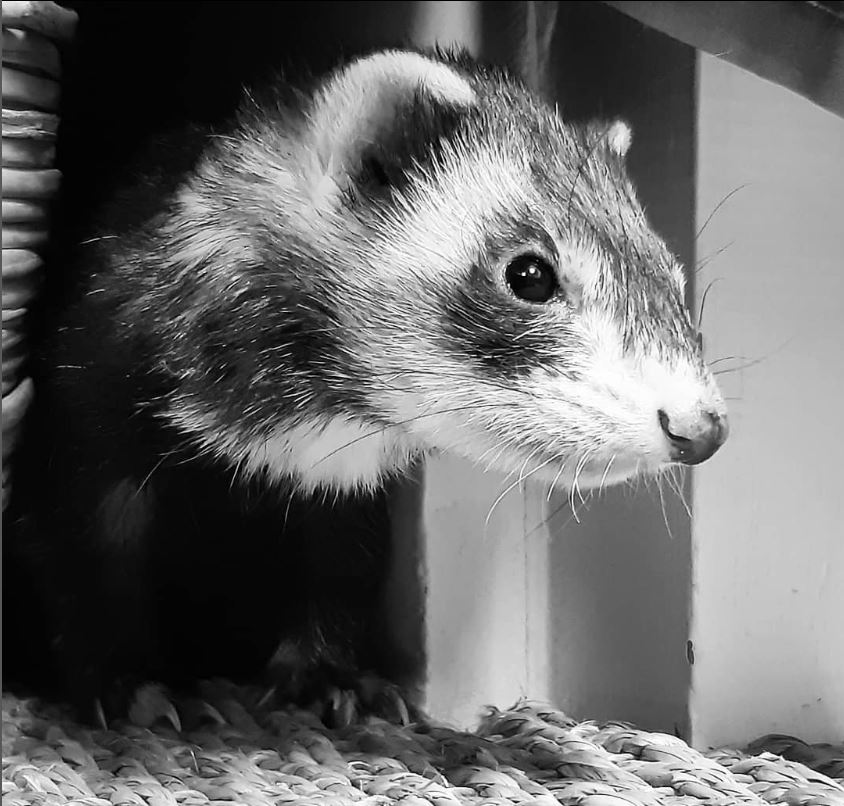New RVC research reveals how pet ferret owners’ awareness of animal boredom can impact their pet’s welfare

New research from the Royal Veterinary College (RVC) has revealed the extent to which pet ferret owners are aware of and understand ferret boredom. The study found that, although most owners believed their ferrets could experience boredom, owners who doubted this capability in ferrets provided a significantly less stimulating environment for their pets. This builds on previous RVC research which has shown how a lack of stimulation and effective habitats can cause seeking and excessively inactive behaviour. This study hopes to raise awareness amongst pet owners to ensure ferrets are provided with appropriate environments to safeguard their wellbeing.
Research into animal boredom is in its infancy and is an animal welfare risk due to the predictable routines and confined living conditions that often typify captivity. With an estimated one hundred thousand pet ferrets in the UK alone and given that ferrets are well known for their inquisitive natures, it is important to understand owner perception, recognition and mitigation of ferret boredom, so owners can ensure their pets live happy and healthy lives.
Conducting this research, the RVC team set out to unveil the extent to which pet ferret owners believe that ferrets can experience boredom and whether owners’ beliefs of ferret boredom were linked to the environmental enrichments or housing they provided, or the style of training they used for their ferrets. This was achieved by gathering and analysing 621 responses to an online questionnaire completed by ferret owners worldwide.
The results showed that 93 per cent of owners believed ferrets could experience boredom and that housing with other ferrets, human interaction, and exploring new items or places were the most important ways to prevent boredom. However, owners who doubted that ferrets could feel bored gave their ferrets only an average of 11 types of environmental enrichment, such as bedding, toys and shelters, compared with 13 types provided by owners who perceived ferrets as capable of getting bored. Depending on which enrichment types were missing in each case, this could significantly affect ferret welfare.
Moreover, the team analysed the behaviours that owners associated with boredom. These showed that ‘scratching at enclosure walls’ and ‘sleeping more than normal’ were key behaviours that owners used to distinguish ferret boredom from other emotions. Pacing around the enclosure, yawning, and resting with their eyes open were also suggested. This aligns with predictions that boredom in animals causes both active seeking behaviour and excessively inactive behaviour.
These results suggest that where pet owners expressed a doubt over ferrets’ ability to experience boredom, they may unknowingly provide significantly fewer environmental enrichment types, potentially negatively impacting their pet ferret’s welfare. Raising awareness of ferrets’ emotional capabilities with pet owners through information dissemination could be a viable approach to improving ferret management and welfare.
Dr Charlotte Burn, Senior Lecturer in Animal Welfare and Behaviour Science at the RVC, said:
“Boredom is an unusual emotion because it causes both restless activity and drowsy inactivity, as individuals try and fail to find stimulation. This really ties in with what ferret owners recognised as signalling boredom in their pets, because they described the ferrets alternating between scratching at their enclosures, as if trying to escape, and then sleeping too much. That combination of behaviour also gives us some insight into how distressing it can be for captive animals to have nothing to do day after day, so it really matters that owners provide enough enrichment to occupy their pets.”
Alice Dancer, PhD Student at the RVC, and lead author of the paper, said:
“It’s a really encouraging sign for pet ferret welfare that most owners believe ferrets can experience boredom. We’ve all experienced boredom ourselves and can testify that it’s an unpleasant emotion when we can’t avoid it. Understanding how we can recognise boredom, and crucially, how we can prevent it in our pets is incredibly important for improving their welfare. With the help of pet ferret owners from around the world we are a step further in understanding a bored ferret’s behaviour, and some of the ways we can try and prevent it.”
Notes to Editors
Reference
Dancer, A.M.M.; Díez-León, M.; Bizley, J.K.; Burn, C.C. (2022) Pet owner perception of ferret boredom and consequences for housing, husbandry, and environmental enrichment. Animals, 12, 3262.
The full paper is available from Animals and can be accessed here: https://doi.org/10.3390/ani12233262
For media enquiries, please contact:
- jasmin.devivo@plmr.co.uk or rvc@plmr.co.uk
- Press Line: 0800 368 9520
About the RVC
- The Royal Veterinary College (RVC) is the UK's largest and longest established independent veterinary school and is a Member Institution of the University of London.
- It is one of the few veterinary schools in the world that hold accreditations from the RCVS in the UK (with reciprocal recognition from the AVBC for Australasia, the VCI for Ireland and the SAVC for South Africa), the EAEVE in the EU, and the AVMA in the USA and Canada.
- The RVC is ranked as the top veterinary school in the world in the QS World University Rankings by subject, 2022.
- The RVC offers undergraduate and postgraduate programmes in veterinary medicine, veterinary nursing and biological sciences.
- The RVC is a research led institution with 88% of its research rated as internationally excellent or world class in the Research Excellence Framework 2021.
- The RVC provides animal owners and the veterinary profession with access to expert veterinary care and advice through its teaching hospitals and first opinion practices in London and Hertfordshire
